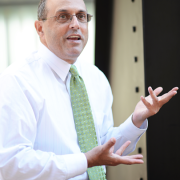Why aren't sports teams stepping up to the plate on climate change?
Sports teams have a long history of speaking out on social issues and political causes consistent with their "values" — so why aren't more franchises confronting climate risks?

Last month, Major League Baseball’s Tampa Bay Rays signed onto a legal brief urging the U.S. Supreme Court to end state bans on same-sex marriage. The club said, in part, that support for gay marriage is “consistent with our values.”
The Rays were joined in their advocacy by the San Francisco Giants and New England Patriots — actions in and of themselves that are notparticularly surprising; sports long have been intertwined with social movements and political causes.
Jackie Robinson broke the baseball color barrier 68 years ago. Muhammad Ali refused to fight in the Vietnam War. Billie Jean King advocated for and and helped win equal pay for women in tennis.
The question now: Why aren't sports teams in locales particularly vulnerable to climate risks doing more to up political pressure on the issue?
Given the threat of climate threats such as extreme storms and sea-level rise in coastal markets such as Florida — where state employees also were recently barred from using the terms “climate change” and “global warming” — it’s time for the Rays and other professional and college teams in the state to speak out forcefully on climate change denial.
Sinking to a new low on climate
For a sense of the political reality of climate issues in Florida, just take a look at an excerpt from a recent Miami Herald story:
“Florida Department of Environmental Protection (DEP) officials have been ordered not to use the term ‘climate change’ or ‘global warming’ in any official communications, emails or reports, according to former DEP employees, consultants, volunteers and records obtained by the Florida Center for Investigative Reporting.” A follow-up story revealed that other state agencies were subject to the same ban.
This policy, per reporter Tristram Korten, “went into effect after Gov. Rick Scott took office in 2011 and appointed Herschel Vinyard Jr. as the DEP’s director, according to former DEP employees.” Scott, reelected last November, used the “I’m not a scientist” dodge when asked about the topic during the fall campaign.
There might be some humor in this were it not that Florida is one of the states most susceptible to the effects of global warming in the U.S., according to many scientists and scientific studies.
Wait, there is humor in this: Check out this two-minute video from a recent Florida Senate hearing. A Florida state employee, discussing climate change, can’t bring himself to say the actual words, while his questioner from the state Senate, unencumbered by the ban, tries to come up with another phrase (“atmospheric re-employment?”).
So, you’ve got a state that is perhaps Ground Zero when it comes to climate change, but its own environmental agency bans employees from talking about climate change. You can’t make this stuff up.
On deck
Now, one might say, “This is crazy, but why should sports teams care?”
Well, to quote Rays’ President Brian Auld, because it’s “consistent with our values.”
- Free speech, including the right to publicly speak and write words that are not deemed obscene such as “climate” and “change”, certainly must be consistent with the Rays’ (and Dolphins', Magic's, Lightning's, etc.) values.
- Having a habitable state of Florida must be consistent with the teams’ values. After all, it is a prerequisite to being able to play sports and attend sports events there. Dealing with climate change in Florida is an existential issue. Before you can deal with it, you have to be able to say the words “climate” and “change."
- Being smarter than your opponent to gain an edge is one of sports’ enduring tenets and, thus, has to be consistent with Florida sports teams’ values. In fact, in this age of Moneyball and advanced sports statistics, knowledge as power in sports is more pronounced than ever. How can Florida sports teams stay silent when the state in which they operate is choosing to limit knowledge, to dumb itself down?
What makes all of this even stranger is that GreenSportsBlog already has detailed how the University of Florida is a leader in the greening of its football games. One would think that Jeremy Foley, the Gators’ athletics director and an employee of the state, would say that prohibiting other state employees from saying “climate change” is inconsistent with their values.
GreenSportsBlog has not been able to find any statements from any Florida sports teams protesting the ban on state employees using "climate change."
We know, it was an unwritten rule, per Scott and his spokespeople. But there is enough concrete evidence to know that the ban was/is real — just as climate change itself is real.
So, come on, Florida sports teams. Step up to the plate and say, 1. Climate change is real, and 2. State employees must be allowed to talk openly about the threats posed to the state by a volatile climate.
This story originally appeared at GreenSportsBlog.





